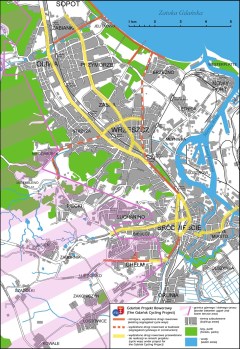Bicycle rides organized by the Obywatelska Liga Ekologiczna (local environmental NGO, the chief cycling advocate in the region) attracted more than thousand people and impressed local politicians. In 1999, the Mayor set up a team to investigate whether cycling infrastructure could be possibly funded under European Union ISPA program. This was exactly when Global Environment Facility (GEF) announced its Operational Program 11 - mitigating climate change induced by transport. Cycleway construction projects were eligible.
Gdańsk authorities, local cycling community and Cities for Bicycles, aided by Przemek Czajkowski of UNDP Poland were quick to make decision: Gdańsk will apply for GEF OP11 medium sized grant, not ISPA. The team that immediately started work on the project proposal included Roger Jackowski (OLE Gdańsk), Marcin Hyła (Cities for Bicycles), Przemek Czajkowski (UNDP Poland), mr. Antoni Szczyt (Municipality of Gdańsk), Susan Legro (UNDP Climate Change coordinator for Central Europe) and Cynthia Page (UNDP Headquarters). The draft proposal was ready in September 2000, the formal submission procedures were completed in December 2000. In May 2001, the GEF decision was positive: Gdańsk got funding (see the project document, .pdf file, 3 MB). It turned out that it was the fastest developed medium sized project in GEF history.
Now, with some unexpected delays, the project is under way and - according to the Project Document - will be completed in 2004.
Gdańsk Project is about three things:
The long term goal is to
increase bicycle use in Gdańsk to 5-10% of all
trips (currently near 1-2%) and in this way, control the motorized
transport induced emissions of greenhouse gases by 250,000 tons in 15
years. The 5-10% figure is similar to the cycling levels in cities in
southern Sweden, just across the Baltic Sea. It seems feasible, judging
from the polls
commissioned by the Miasta dla rowerów from polling and market research
companies (TNS OBOP and BBS Obserwator).
Most people interviewed by those reserach groups quote lack of cycling
facilities as primary reason they do not cycle. And there apparently is
a vast pent-up
demand for cycling in cities as every fourth person expresses readiness
to cycle to work.
The segregated facilities were selected following a multi-criterional analysis that included the present journey matrix for Gdańsk, bottleneck analysis, technical feasibility analysis and cost analysis. The cycleways to be built concentrate along the main transport corridors in Gdańsk and can easily be continued into the cities of Sopot and Gdynia. There is a good integration with urban rail system. And the Upper Terrace hilly part of Gdańsk has been scrapped, as it is not so densely populated, there are steep hills and segregated cycleways would have to be very long and expensive to build. To see the cycleways under construction, please click here. |
 |
The awareness raising and public participation campaign is self-explanatory. To see the street actions, click here and just follow the links (this page is in Polish). An important part of the project is quality control and public participation, including users' representation. Pictures from public meetings can be viewed here.
The know-how dissemination and project replication includes bulletin production and distribution, workshops for local authorities across Poland and consulting. Ten workshops have been completed and one proposal for cycling infrastructure funding has been prepared and submitted by the Municipality of Cracow.
We see the Gdańsk project as a major breakthrough for Poland. This is the first and so far only case in Poland that the grass-root community developed project of this size (total cost of the project is 2.5 million US dollars), got the municipality involved politically and financially, succeeded in fundraising and now co-operates on implementation together with the Ministry of Environment and other project partners (see below). The Gdańsk project is the first complex cycling activity of local government in Poland that is user-oriented and quality-oriented. It is also the first one that has already resulted in radical improvements for cyclists in Poland.
The Gdańsk project in fact created a model for co-operation and project management ("Cycling Package") that seems to work well, is easily understood by potential beneficiaries, fits the Polish legal framework and is being implemented in other cities.
Will keep you updated on the Gdańsk Project developments.
Below, you can find the contacts for all institutions involved in the project.
Urząd Miejski w Gdańsku (Municipality of Gdańsk):
Marek Sojka, Project Manager
Antoni Szczyt, Wydział Inżynierii Miejskiej
ul. Nowe Ogrody 8/12 80-803 GDAŃSK
tel. +48.58.3023020
tel. +48.58.3023041
fax. +48.58.3026900
www.gdansk.pl
Obywatelska Liga Ekologiczna:
Roger Jackowski, Przemek Miler
ul. Zbyszka z Bogdańca 56A 80-419 GDAŃSK
tel./fax +48.58.5201020
www.rowery.gdansk.pl
Polski Klub Ekologiczny/Miasta dla rowerów:
(Polish Ecological Club/Cities for Bicycles)
Marcin Hyła
ul. Sławkowska 26A 31-014 KRAKÓW
tel. +48.12.4232074
fax. +48.12.4232098
www.rowery.org.pl
Ministerstwo Środowiska (Ministry of Environment)
Departament Instrumentów Ochrony Środowiska
dyrektor Wojciech Jaworski
Monika Lesz
ul. Wawelska 52/54 00-922 WARSZAWA
tel. +48.22.5792522
fax. +48.22.5792217
www.mos.gov.pl
UNDP - United Nations Development Program
Ewelina Pusz, Program Officer
al. Niepodległości 186, 00-608 WARSZAWA
tel. +48.22.8259245
fax. +48.22.8254958
fax. +48.22.8255785
www.undp.org.pl